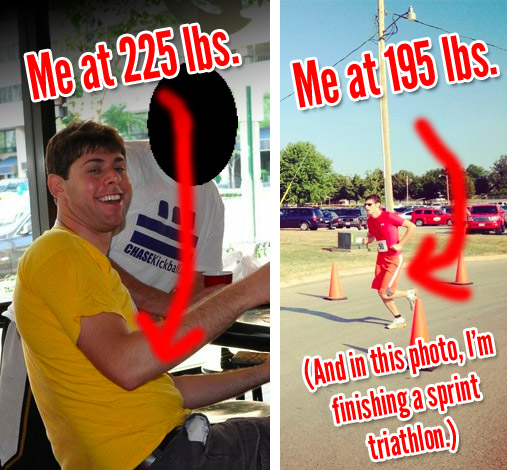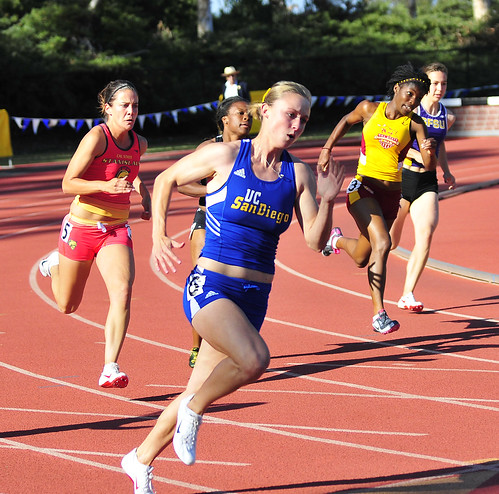
“Staying comfortable is the number one way to stay exactly where you are.” — Kate Matsudaira
In 2008, when I got my new driver’s license, I weighed in at 175 pounds. By the end of senior year, as I started to grow into myself, I hit 190. But I was still pretty darn skinny. I’m 6’5”, and at that height, people don’t really notice a belly until you start putting on serious weight.
But in Winter/Spring 2011, I was living at home, and I put on weight quickly. It wasn’t hard to do. I was living with my parents, and my parents were always putting food in front of me. We had Girl Scout cookies everywhere. My dad was trying to convince me to put whipped cream on chocolate milk before bed.
I wasn’t working out, and I didn’t belong to a gym.
The tipping point came in May. I went to my sister’s college graduation, and I realized that I could only fit into my suit if I sucked in — hard. None of my jeans fit anymore.
When I saw the scale — TWO HUNDRED TWENTY FIVE POUNDS! — I was shocked. I knew it was bad, but I didn’t realize it was that bad. It’d never weighed that much before.
But then three wonderful things happened. And by the end of Summer 2012, I was down to 195 lbs. I was in the best shape I’d ever been in, and I was also — not coincidentally — as happy as I’d ever been. In August, I finished a sprint triathlon.
There aren’t any secrets to losing 30 pounds in a year. There’s no mystery. All you need to do — and anyone can do them — are these three things:
1. Starting Cooking For Yourself — When you eat out — or when someone else cooks for you — it’s easy to put crap into your body. When I was at college, I always joked about the “Winter Break 15.” At home, I’d go on a diet of Thin Mints and leftovers, and I’d always come back to school a few pounds heavier. When you’re not cooking for yourself, you’re usually not thinking as much about what you’re eating.
When you start shopping for yourself, you start making better decisions. You start choosing good stuff to put in your shopping cart — fruits, vegetables, protein, grains — and start leaving out the junk.
And actually cooking the food helps, I’ve found. It makes you extra conscious of the stuff you’ve had other people sneaking into your food all these years — butter, fatty oils, etc. When you cook for yourself, you’ll start leaving those things out.
Cooking for yourself is how you can hold yourself fully accountable for what goes into your body.
2. Start Exercising — Again, there’s no magic here. The first thing I did when I moved out to Missouri was join a gym. I started going a couple of days a week for 45-60 minutes each morning. When I noticed my enthusiasm lagging, I hired a personal trainer to work with me twice a week. I find that I work out much better when others are doing it with me.
But I know that personal trainers — even in Columbia, Mo. — are expensive. So here’s an alternative: Find a class you can take. Find a group you can run with. Join a local league for soccer or frisbee. It’ll all help.
3. Create Routine — Any health pro can tell you this: Diets don’t work because diets don’t create routine. Go on South Beach for two months and you might lose 10 lbs., but as soon as you drop the diet, you’ll gain it all back.
Diets are like duct tape: They’re an okay temporary solution, but they’re not always pretty, and they’re certainly not something you should rely on for too long.
What you want is to build something lasting for yourself. Build out a block of time in every week to work out, and find time to go grocery shopping once or twice a week. The more you shop, the more likely you are to buy stuff like fresh vegetables, and the less likely you are to stock up on the frozen stuff.
The longer you keep all of these things going, the better. Work begets work. Healthy habits beget healthy living.
Getting in shape doesn’t need to be a mystery. It requires a lot of work. It requires a certain persistence — you absolutely have to be willing to put one foot in front of the other, and again, and again, and again.
But something wonderful comes at the end of all of it.
A month ago, I went to a wedding with a friend. She had made fun of me a year earlier for having to buy bigger jeans.
So this time, before I hopped on the plane to see her, I stopped at Old Navy. I discovered I’d dropped a full size — from a 38 waist to a 36.
When I finally saw her, I showed off the new belly. The word “astonished” came out of her mouth.
You can earn that kind of reaction, too. Just do these three things — cook, exercise, and create a routine — and keep it going. That’s the roadmap to getting yourself into the shape you want.
It is not magic. In fact, it’s a little bit boring.
But I’m living proof: It gets results.










